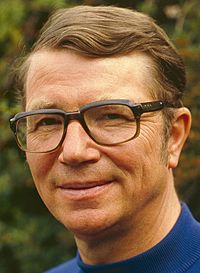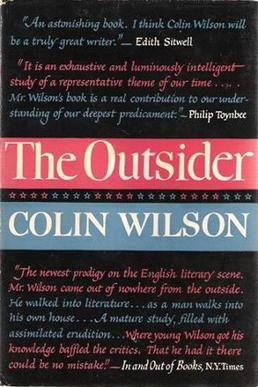Colin Wilson facts for kids
Quick facts for kids
Colin Wilson
|
|
|---|---|

Wilson in Cornwall, 1984
|
|
| Born | Colin Henry Wilson 26 June 1931 Leicester, Leicestershire, England |
| Died | 5 December 2013 (aged 82) St Austell, Cornwall, England |
| Occupation | Writer |
| Nationality | British |
| Period | Active: 1956–2013, 20th century |
| Genre |
|
| Literary movement | Angry young men |
| Notable works |
|
Colin Henry Wilson (born June 26, 1931 – died December 5, 2013) was a British writer. He wrote many books, over a hundred in total. He explored topics like real-life crime, mysticism (which is about spiritual truths), and the paranormal (things beyond normal science).
Colin Wilson called his own way of thinking "new existentialism". This is a philosophy that looks at the meaning of life and human freedom. He believed his main goal was to create a new, hopeful way of looking at existentialism.
Contents
Early Life and Beginnings
Colin Wilson was born in Leicester, England, on June 26, 1931. His father worked in a shoe factory. When he was 11, he went to Gateway Secondary Technical School. Here, he became very interested in science. By age 14, he had written many essays about science.
However, by the time he left school at 16, his interests changed to literature. He was greatly inspired by the writer George Bernard Shaw. Colin started writing his own stories, plays, and essays. He even thought he could be Shaw's next great successor.
After a few jobs he didn't enjoy, he joined the Royal Air Force. But he often disagreed with the rules and left soon after. He then took on many different small jobs and traveled around Europe. In 1951, he returned to Leicester.
He later moved to London and continued to work on his writing. He sometimes even slept outside to save money.
The Outsider Book
In 1956, when Colin Wilson was 24, his book The Outsider was published. This book looked at how certain famous writers and thinkers felt like "outsiders" in society. He wrote about people like Albert Camus, Jean-Paul Sartre, Ernest Hemingway, and Vincent van Gogh.
The book explored how these figures felt disconnected from society. The Outsider became a huge success and helped make existentialism popular in Britain. It has been printed ever since and translated into more than 30 languages.
Colin Wilson's Career
Non-Fiction Writing
Colin Wilson became known as one of the "angry young men" in British literature. This was a group of writers who expressed their frustration with society. Wilson and his friends were especially interested in spiritual ideas.
Even though The Outsider was a hit, his second book, Religion and the Rebel (1957), received negative reviews. However, Wilson believed it was a more important book. While The Outsider focused on mental struggles, Religion and the Rebel explored how to expand our minds.
Wilson continued to write about his hopeful "new" existentialism. He wrote six philosophical books, which he called "The Outsider Cycle." He later summarized these ideas in Introduction to the New Existentialism (1966).
In his book The Age of Defeat (1959), he felt that heroes were disappearing from modern life and literature. He believed people were starting to feel unimportant. This idea led the famous American psychologist Abraham Maslow to contact him.
Wilson and Maslow became friends and wrote to each other often. Maslow studied "peak experiences," which are sudden moments of great happiness. Wilson believed these moments could be controlled and even created on purpose. He wrote books like Access to Inner Worlds (1983) and Super Consciousness (2009) about this.
Wilson also developed "Existential Criticism." This idea suggested that art should be judged not just by its style, but also by what it says about the meaning of life. He wrote many essays and books on this topic. He also reviewed hundreds of books, applying his unique critical approach.
Later in his career, Wilson became very interested in metaphysics (the study of reality) and occult themes (hidden knowledge). In 1971, he published The Occult: A History. This book looked at figures like Aleister Crowley, George Gurdjieff, and Helena Blavatsky. He also wrote biographies of other spiritual thinkers.
Wilson explored the idea of "Faculty X." This is a special ability he believed could lead to a deeper sense of meaning. He also explored abilities like telepathy (mind reading) and the awareness of other energies. In his later work, he even suggested the possibility of life after death.
He also wrote many non-fiction books about crime, including studies of serial killing. He was especially interested in the mystery of Jack the Ripper.
Fiction Writing
Colin Wilson used his novels to explore his ideas about human potential and consciousness. He often wrote detective fiction or science fiction. Sometimes, he would write a non-fiction book and a novel at the same time.
Many of his novels, like Ritual in the Dark (1960), explored the psychology of murder. But he also wrote philosophical science fiction. Some of his well-known science fiction books include The Mind Parasites (1967) and The Philosopher's Stone (1969).
He also wrote a four-book series called Spider-World:
- Spider World: The Tower (1987)
- Spider World: the Delta (1987)
- Spider World: The Magician (1992)
- Spider World: Shadowland (2003)
Colin Wilson wrote the Spider World series after the famous author Roald Dahl suggested he write a novel for children. Wilson said he would like to be remembered most for writing Spider World.
He also wrote stories connected to the Cthulhu Mythos, a fictional universe created by H. P. Lovecraft. Although Wilson initially criticized Lovecraft's writing, he later explored Lovecraft's ideas in his own fiction.
Film Adaptations
The film Lifeforce was made in 1985. It was based on Colin Wilson's novel The Space Vampires.
In 2018, a film based on his 1961 novel Adrift in Soho was released.
Later Life and Passing
In 2011, Colin Wilson had a major spinal operation. After this, he suffered a stroke and lost his ability to speak. He was admitted to the hospital in October 2013 for pneumonia.
Colin Wilson passed away on December 5, 2013. He was buried in the churchyard at Gorran Churchtown in Cornwall. A special service was held for him in London in 2014.
Images for kids
See also
 In Spanish: Colin Wilson para niños
In Spanish: Colin Wilson para niños
 | Shirley Ann Jackson |
 | Garett Morgan |
 | J. Ernest Wilkins Jr. |
 | Elijah McCoy |



